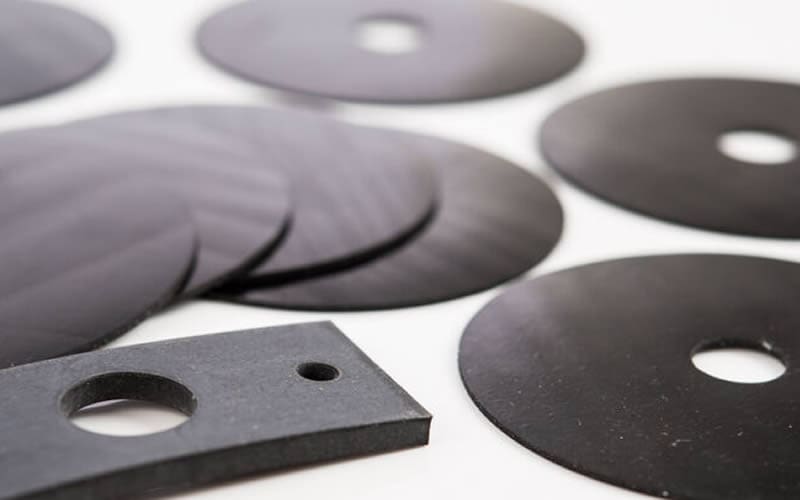Neoprene is one of the most widely used elastomers in industrial sealing, insulation, and vibration control applications. Its balance of durability, flexibility, and resistance makes it a reliable choice where performance matters over time. At Stephens Gaskets, we work extensively with neoprene to manufacture precision gaskets, washers, and shims for demanding environments.
With more than 70 years of experience in gasket and component manufacturing, we understand how neoprene properties translate into real-world performance, not just datasheet claims.
What Is Neoprene?
Neoprene is a synthetic rubber, technically known as polychloroprene. It is produced through the polymerisation of chloroprene, followed by vulcanisation to enhance strength, elasticity, and stability.
This manufacturing process creates an elastomer that offers a strong balance of mechanical performance, environmental resistance, and versatility, making neoprene suitable for a wide range of industrial applications.
Key Neoprene Properties
Neoprene is specified because it performs reliably across multiple operating conditions where natural rubber and lower-grade elastomers may fail.
Key properties include:
- Good resistance to oils, greases, and petroleum-based fluids.
- Stable performance across a wide temperature range.
- Excellent weathering, ozone, and UV resistance.
- Strong bonding capability to metals and other materials.
- Good mechanical strength and abrasion resistance.
- Effective vibration damping and noise reduction.
These characteristics make neoprene a dependable, general-purpose material for industrial use.
Temperature Resistance
Unlike natural rubber, neoprene maintains its physical properties across both hot and cold environments. It performs reliably in applications involving continuous operating temperatures as well as short-term temperature fluctuations.
This temperature stability makes neoprene suitable for:
- Outdoor installations.
- Industrial machinery.
- Automotive and transport applications.
- Electrical enclosures and housings.
Chemical and Environmental Resistance
Neoprene offers good resistance to a wide range of chemicals, particularly oils, greases, and mild solvents. Its molecular structure reduces susceptibility to oxidation and environmental degradation, resulting in a long service life.
This resistance is a key reason neoprene is commonly used in:
- Oil and fuel sealing applications.
- Industrial plant environments.
- Marine and coastal settings.
Bonding and Fabrication Advantages
One of neoprene’s most valuable properties is its ability to bond effectively to other materials. This allows neoprene to be laminated or bonded to metals such as steel, stainless steel, copper, and brass.
This property enables the manufacture of:
- Bonded rubber-metal components.
- Composite gaskets and seals.
- Safety and protective equipment.
At Stephens Gaskets, we use this capability to produce bespoke neoprene components that meet specific design and performance requirements.
Common Applications of Neoprene
Thanks to its balanced performance, neoprene is used across a wide range of industries.
Typical applications include:
- Neoprene gaskets and washers.
- Seals for oil and fluid systems.
- Electrical insulation and enclosure sealing.
- Anti-vibration pads and spacers.
- Protective and safety equipment.
Neoprene is often selected where reliability, durability, and value are equally important.
Neoprene Gaskets and Washers from Stephens Gaskets
At Stephens Gaskets, neoprene is routinely used to manufacture precision gaskets, washers, and shims to customer specifications. Material grade, thickness, and hardness are selected to suit the application and operating environment.
Our manufacturing processes ensure consistent quality, dimensional accuracy, and repeatable performance across both low-volume and high-volume orders.
Why Choose Stephens Gaskets for Neoprene Components?
Customers choose Stephens Gaskets because we combine material knowledge with manufacturing expertise.
Working with us gives you:
- Access to experienced neoprene material specialists.
- Bespoke gasket and washer manufacturing capability.
- ISO 9001-certified quality systems.
- Reliable UK-based production and supply.
- Technical support from specification through to delivery.
FAQs
1. What are the main properties of neoprene rubber?
Neoprene offers good oil resistance, temperature stability, weather resistance, strong bonding capability, and long-term durability, making it suitable for many industrial applications.
2. Is neoprene suitable for oil and fuel applications?
Yes. Neoprene is commonly used for oil and fuel sealing due to its resistance to petroleum-based fluids.
3. How does neoprene compare to natural rubber?
Neoprene generally offers better resistance to oils, weathering, and temperature extremes compared to natural rubber.
4. Can Stephens Gaskets manufacture custom neoprene gaskets and washers?
Yes. We specialise in bespoke neoprene gasket and washer manufacturing to custom shapes, sizes, and thicknesses.
5. How do I get advice on neoprene material selection?
For advice on neoprene properties or component selection, contact Stephens Gaskets with your application details. Our team will provide expert guidance and a tailored quotation.
Speak to a Neoprene Specialist
If you are specifying neoprene for gaskets, washers, or shims, speak directly with Stephens Gaskets.
Our specialists will help you select and manufacture a solution that delivers reliable performance in your application.
Contact Our Team
Phone: +44 (0)121 544 5808
Email: sales@stephensgaskets.co.uk to discuss your requirements.
Visit Our Website
Address: Stephens Gaskets Ltd, 19 Hainge Road, Tividale, Oldbury, West Midlands B69 2NR.

